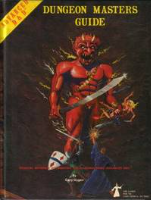Back in the day ('89 to '94), me and 6 other friends/family ran a pen and paper gaming club. (Wanted to expand, so placed a small ad bulletin in a local classifieds paper, and a guy turned up with black candles insisting to burn a candle with every game session.... true story, but I digress.) Over our gaming tenure we ran multiple campaign worlds, mostly in D&D2ndEd. The Realms, Ravenloft, Dragonlance, Spelljammer, DarkSun and a multitude of custom made world failures that was great fun anyway. We played religiously every Saturday from 12noon until the wolves started howling, it was a time I cherish ...and I wish I could have that kind of freedom on available time again. (Digress, stay focussed dammit!!) Our main campaign was in the Realms, but with the start of every new campaign series, we would dedicate a full gaming day to build the characters for the upcoming new sessions. And with build, I mean build in the most literate way possible. The DM of the new campaign (3 in the group rotated DM duties, each "owning" a different campaign) would explain the world, specific rules, features, history and any other tidbit in generic knowledge a player would need to understand the specific game world. Then the fun started... which involved only real dice and sourcebooks, and off-center faded toner xeroxed copies of blank character sheets. One by one, we would each roll ability scores, the foundation of any D&D character. Notice...at this point we did NOT select a race or class. We were purely rolling ability scores, based on a 3d6+x system, moderated by the DM of the day. There was 2 standing house rules: - You must nominate 3 abilities prior to rolling, once rolled and score assigned, they cannot be changed or swapped (unless racial modifiers etc allows you to). - You may choose to swap out 1 score with any of the 2 remaining non-nominated scores once, after rolling. The amusement, laughter and brilliant roleplay that ensued to fit a class into the abstract ability scores, is something that I miss in today's version of rolling (creating! not rolling) a character. It created a sense of ownership, care and dare I say, love, for our characters that is sometimes hard to find today. I would go so far as to say "rolling" a character in today's terms is a total misnomer. The way characters are created in most of our games now is just that... a creation. That all said, I do understand that there will be face-to-face groups out there still rolling characters in a meaningful way. I also understand that the online platform and grouping systems lends itself towards character creation rather than rolling as time becomes a factor... But grant a D&D old-timer (now converted to 3.5 - v4 is too much of a leap from the good days) his lament and nostalgia... the true rolling of a character is sadly replaced by this new world of easy-instant for many players of this great game... ultimately at the loss to the players themselves. I wish I could take you all there, you would choose to never return to easy-instant if you could help it. __________________________________________ Which brings me to the next topic semi-related to the above and probably one of my biggest pet hates in players. The player that study every race/class/ability/feat/skill to create (not roll) a min/maxed character with 100% optimization in order to obtain that unique equilibrium of over-powered epicness. (God, I hate the word epic..)
Play Now
Join a Game
Shop
Tools
Characters
Compendium
Community

Sign In












